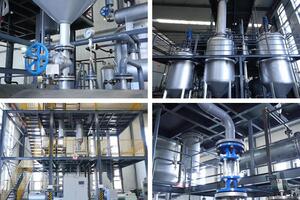Market Demand and Applications for Products from Continuous Waste Oil Refineries
Body
This article explores the growing market demand for products from continuous waste oil refineries and the wide range of applications that these products serve.
Market Demand for Products from Continuous Waste Oil Refineries
Continuous waste oil refineries are playing a pivotal role in addressing the growing demand for sustainable and eco-friendly solutions. The market for their products is expanding rapidly, driven by several key factors:
- Environmental Concerns: With increasing awareness of environmental issues and the need to reduce carbon footprints, there is a growing demand for sustainable alternatives. Products from continuous waste oil refineries offer a way to recycle used oil, preventing its improper disposal and environmental contamination.
- Regulatory Requirements: Governments and environmental agencies worldwide are imposing strict regulations on the disposal of used oils. Continuous waste oil refineries provide a compliant and sustainable solution, ensuring adherence to these regulations.
- Resource Conservation: The products from these refineries reduce the demand for virgin resources, such as crude oil, by recycling and repurposing used oils. This aspect aligns with global efforts to reduce resource consumption and promote a circular economy.
Applications for Products from Continuous Waste Oil Refineries
The products generated by continuous waste oil refineries find versatile applications across various industries, including:
- Base Oils: Refined base oils produced from waste oils serve as a crucial component in the manufacturing of lubricants and hydraulic fluids. These base oils meet industry specifications and can be used in a wide range of applications, including automotive, industrial, and marine lubricants.
- Fuel Blending: Waste oil refineries produce high-quality, low-sulfur fuel oils that can be blended with diesel or used as an industrial heating fuel. This repurposed fuel can reduce emissions and lower the environmental impact of various industries.
- Re-Refined Lubricants: Waste oil can be re-refined into lubricants and greases, offering a sustainable alternative to traditional lubricants. These re-refined products perform as well as their virgin counterparts, making them attractive to environmentally conscious consumers.
- Asphalt Production: Refined waste oil can be used as a binder or flux in asphalt production. This not only provides a valuable application but also contributes to the recycling of materials in the construction industry.
- Metalworking Fluids: The refined oils are suitable for use as metalworking fluids in machining and metal fabrication processes, ensuring effective cooling and lubrication while minimizing waste.
- Additives and Specialty Products: Some waste oil refineries can extract valuable additives and specialty products, such as solvents and waxes, which have applications in various industries including chemicals, cosmetics, and pharmaceuticals.
Conclusion
Continuous waste oil refineries are at the forefront of sustainable solutions for handling used oils and converting them into valuable products. The market demand for these products is on the rise, driven by environmental concerns, regulatory requirements, and the desire for resource conservation. The versatile applications of products from these refineries span various sectors, offering greener alternatives in lubricants, fuels, asphalt, and more. As the world continues to prioritize sustainability, the market for products from continuous waste oil refineries is poised for further growth, contributing to a cleaner and more environmentally responsible future.












Comments